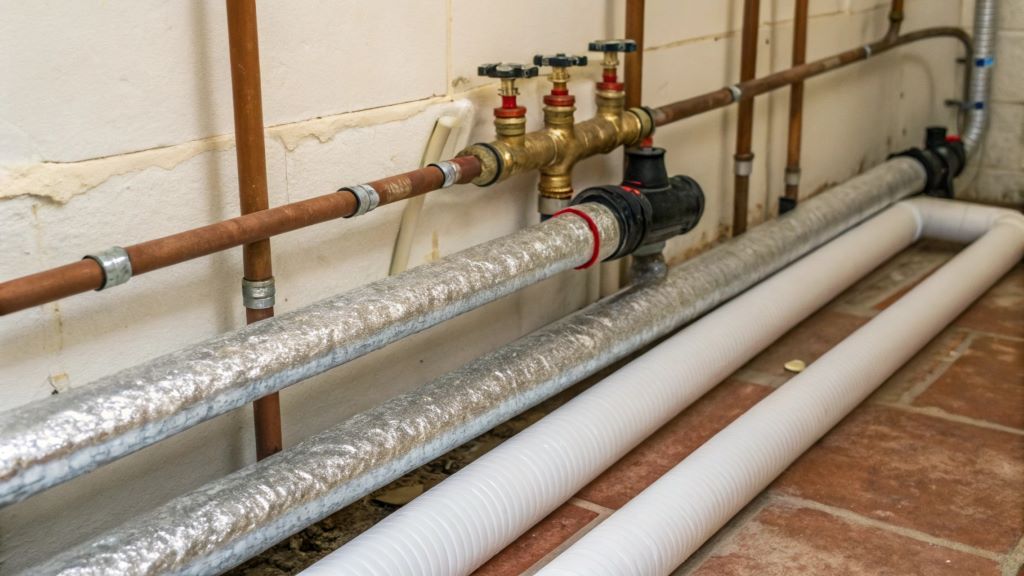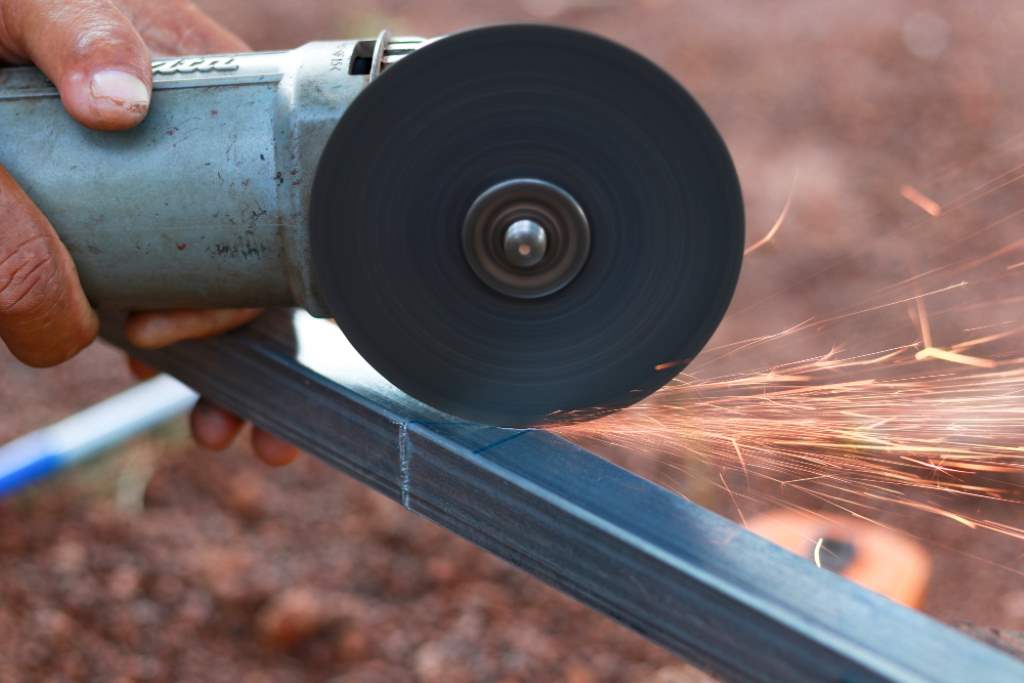If you’ve ever heard a loud banging or knocking sound coming from your pipes when you turn on the hot water, you’re not alone. This phenomenon, often called “water hammer” or pipes knocking when hot water is turned on , is a common plumbing issue that can be both annoying and concerning. Not only does it disrupt the peace of your home, but it may also signal underlying problems in your plumbing system. In this comprehensive guide, we’ll explore why pipes knock when hot water is turned on, how to fix the issue, and steps to prevent it from happening again. By the end, you’ll have a clear understanding of this problem and actionable solutions to restore quiet and efficient plumbing.
What Causes Pipes to Knock When Hot Water Is Turned On?
Pipe knocking, or water hammer, occurs when the flow of water in your pipes is suddenly stopped or redirected, causing a pressure surge that makes the pipes vibrate or bang against each other or nearby structures. When it happens specifically with hot water, several unique factors come into play. Here are the most common causes:
-
Thermal Expansion
When hot water flows through cold pipes, the pipes expand due to the heat. If the pipes are tightly secured or lack enough space to expand, they may rub against walls, joists, or other pipes, creating a knocking or creaking sound. This is especially common in older homes with metal pipes like copper or steel, which expand more noticeably than modern plastic pipes like PEX.
-
Water Hammer from Sudden Valve Closure
When you turn off a hot water tap quickly, the fast-moving water stops abruptly, sending a shockwave through the pipes. This pressure surge, known as water hammer, causes the pipes to bang against each other or nearby surfaces. Hot water tends to flow faster due to lower viscosity, making this issue more pronounced than with cold water.
-
Loose or Improperly Secured Pipes
Pipes that aren’t properly fastened can move when water flows through them, especially hot water, which causes expansion. If the pipes are loose, they may knock against walls, floors, or other fixtures, amplifying the noise.
-
High Water Pressure
Excessive water pressure can exacerbate pipe knocking. When pressure is too high (typically above 80 psi), the force of the water—especially hot water—can strain the plumbing system, leading to banging sounds as pipes shift or vibrate.
-
Air in the Pipes
Air bubbles trapped in the plumbing system can cause irregular water flow, leading to knocking or hammering sounds. This is more common after plumbing repairs or when hot water hasn’t been used for a while, allowing air to accumulate.
-
Faulty or Worn-Out Fixtures
Old or malfunctioning valves, such as those in faucets, showers, or water heaters, can disrupt water flow. For example, a worn washer or a faulty pressure regulator in your hot water system might cause vibrations that result in knocking.
Why Does This Happen Only with Hot Water?
Hot water introduces unique dynamics to your plumbing. As water heats up, it becomes less dense and flows more quickly, increasing the likelihood of pressure surges. Additionally, the thermal expansion of pipes is a factor exclusive to hot water. Metal pipes, in particular, expand and contract significantly with temperature changes, which can lead to noises if the system isn’t designed to accommodate this movement.
Is Pipe Knocking Dangerous?
While occasional mild knocking might not be an immediate threat, persistent or loud banging can cause problems, including:
- Loose Joints: Repeated vibrations can loosen pipe fittings, leading to leaks.
- Pipe Damage: Over time, the stress from water hammer or expansion can crack or weaken pipes.
- Reduced Efficiency: Air or pressure issues may affect your water heater’s performance, increasing energy costs.
Ignoring the issue could lead to costly repairs, so it’s wise to address pipe knocking sooner rather than later.
How to Fix Pipes Knocking When Hot Water Is Turned On
Fortunately, most causes of pipe knocking can be resolved with a mix of DIY solutions and professional help. Here’s how to tackle the problem:
-
Check and Adjust Water Pressure
High water pressure is a common culprit. Use a pressure gauge (available at hardware stores for about $10-$20) to test your home’s water pressure. Ideal pressure is 40-60 psi.
- Solution: If it’s above 80 psi, install a pressure regulator or adjust the existing one (often near your main water shutoff). A plumber can help if you’re unsure.
- Cost: $50-$150 for a regulator, plus labor if needed.
-
Secure Loose Pipes
Inspect accessible pipes in basements, crawlspaces, or behind walls. Look for loose straps, hangers, or pipes rubbing against surfaces.
- Solution: Use pipe clamps, cushioned hangers, or foam insulation to secure pipes and prevent movement. Ensure there’s room for thermal expansion.
- Cost: $5-$20 for materials; DIY-friendly.
-
Install a Water Hammer Arrestor
A water hammer arrestor is a device that absorbs pressure surges, stopping the banging. They’re especially effective for hot water-related knocking.
- Solution: Install an arrestor near the problem area (e.g., near a faucet or water heater). Models screw onto fixtures or can be plumbed into the system.
- Cost: $15-$50 per unit; professional installation may cost $100-$200.
-
Flush the System to Remove Air
Air bubbles can cause knocking. Flushing your plumbing system can help.
- Solution:
- Turn off your water heater for safety.
- Open all hot water faucets in your home, starting from the highest floor.
- Let the water run for 5-10 minutes to purge air.
- Close faucets from the lowest floor up.
- Cost: Free; DIY task.
-
Insulate Pipes
Insulating pipes reduces the noise from thermal expansion and prevents rubbing.
- Solution: Wrap exposed hot water pipes with foam pipe insulation, available at hardware stores. Focus on areas where pipes contact walls or floors.
- Cost: $10-$30 for insulation; DIY-friendly.
-
Inspect and Replace Faulty Fixtures
Worn-out valves or washers in faucets and water heaters can contribute to knocking.
- Solution: Check faucets, showerheads, and your water heater for wear. Replace washers, seals, or the fixture itself if needed. Consider a plumber for water heater issues.
- Cost: $5-$50 for parts; $100-$300 for professional repairs.
-
Call a Professional
If the problem persists or you’re uncomfortable with DIY fixes, hire a licensed plumber. They can diagnose complex issues like hidden leaks, water heater malfunctions, or improper pipe sizing.
- Cost: $100-$500, depending on the issue and location.
How to Prevent Pipe Knocking in the Future
Prevention is key to a quiet, efficient plumbing system. Here are proactive steps:
- Regular Maintenance: Inspect pipes, fixtures, and your water heater annually for wear, loose fittings, or pressure issues.
- Install Expansion Tanks: If thermal expansion is a problem, an expansion tank near your water heater can absorb excess pressure from heated water. Cost: $50-$150.
- Lower Water Heater Temperature: Set your water heater to 120°F (49°C) to reduce thermal expansion and save energy.
- Use Modern Materials: If renovating, consider PEX pipes, which are flexible and less prone to expansion noises than metal.
- Monitor Water Pressure: Check pressure periodically and maintain it between 40-60 psi.
When to Call a Plumber
While many fixes are DIY-friendly, call a professional if:
- Knocking is loud, persistent, or worsens over time.
- You notice leaks, low water pressure, or unusual water heater behavior.
- You’re unsure about pressure regulators, water hammer arrestors, or pipe access.
A plumber can ensure your system is safe and up to code, saving you from bigger issues down the line.
Conclusion
Pipes knocking when hot water is turned on can be a frustrating issue, but it’s often fixable with the right approach. Whether it’s thermal expansion, water hammer, loose pipes, or high pressure, understanding the cause is the first step to a solution. By securing pipes, adjusting pressure, installing arrestors, or flushing air from the system, you can restore peace to your home. For persistent problems, don’t hesitate to consult a plumber. With proper fixes and preventive measures, you’ll enjoy a quiet, efficient plumbing system for years to come.
Key Takeaways
- Pipe knocking is often caused by thermal expansion, water hammer, loose pipes, or high pressure.
- DIY fixes include securing pipes, flushing air, and insulating hot water lines.
- Prevent future issues with regular maintenance, expansion tanks, and proper water pressure.
- Call a plumber for complex or persistent problems.
Have you experienced pipe knocking in your home? Try these solutions and let us know how it goes! For more plumbing tips, check out our other blog posts.
Read More:






